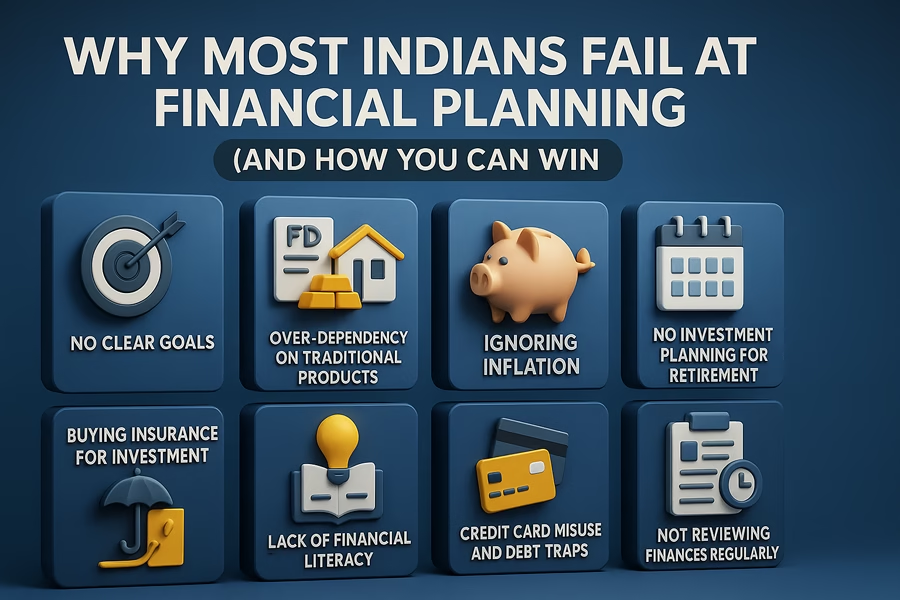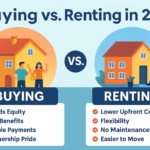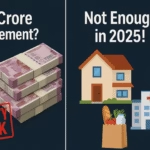“If you fail to plan, you are planning to fail.” – Benjamin Franklin
In India, we take pride in securing our families. We work hard, save diligently, and invest whenever we can. Yet, most Indians still struggle with financial planning. Despite earning well, many find themselves unprepared for emergencies, burdened with debt, or under-invested for retirement.
So why do we fail at financial planning? And more importantly — how can you avoid these mistakes and secure your financial future?
Let’s dive in.
1. No Clear Financial Goals
🚫 The Mistake:
Most people in India save money without a clear purpose. “Just saving” is considered good enough. But without setting clear, measurable goals, you end up with scattered savings and no real financial roadmap.
✅ The Solution:
Break down your goals into short-term, medium-term, and long-term:
- 🕒 Short-term: Emergency fund, travel, small purchases
- ⏳ Medium-term: Buying a car, down payment for house
- 🔮 Long-term: Child’s education, retirement
Use a simple spreadsheet or apps like INDmoney or ET Money to track and prioritize.
2. Over-Dependency on Traditional Products
🚫 The Mistake:
FDs, LIC policies, gold, and real estate dominate Indian portfolios. These aren’t bad, but they often underperform when compared to inflation or mutual funds.
For example:
A ₹1 lakh FD at 6.5% returns around ₹1.88 lakh in 10 years.
A mutual fund with 12% CAGR gives over ₹3.10 lakh in the same time.
✅ The Solution:
Diversify. Use a core-satellite strategy:
- Core: Index Funds, Hybrid Mutual Funds
- Satellite: Real Estate, Gold ETFs, Direct Stocks (10-15% max)
Start small, learn, and scale.
3. Lack of Emergency Fund
🚫 The Mistake:
A sudden medical emergency, job loss, or car repair wipes out your savings or forces you into debt. Sadly, most Indians don’t have even ₹50,000 saved for emergencies.
✅ The Solution:
Build an emergency fund of 6 months’ expenses in a liquid mutual fund or savings account. Start with ₹5,000/month and build over time.
4. Ignoring Inflation
🚫 The Mistake:
People assume ₹1 crore is enough for retirement — forgetting that inflation eats away at purchasing power. What costs ₹50 today might cost ₹150 in 20 years.
✅ The Solution:
Use realistic returns in your planning. Always factor in inflation at 6-7% when calculating future goals. Tools like the FIRE Calculator can help.
5. No Investment Planning for Retirement
🚫 The Mistake:
Most Indians start thinking about retirement in their 40s or even 50s. They rely heavily on EPF or PPF, which alone won’t be enough.
✅ The Solution:
Start investing for retirement early. Even ₹2,000/month in an equity mutual fund from age 25 can give you over ₹1 crore by age 60.
Use the power of compounding — it’s the closest thing to magic in personal finance.
6. Buying Insurance for Investment
🚫 The Mistake:
LIC endowment plans, ULIPs, and traditional plans offer poor returns (4–6%). People mix insurance with investment, resulting in low life cover and low returns.
✅ The Solution:
Buy a pure term insurance policy (coverage of 10x your annual income) and invest the rest in mutual funds. Simple. Effective.
7. Lack of Financial Literacy
🚫 The Mistake:
Schools and colleges don’t teach us personal financial planning. So people trust relatives, agents, or WhatsApp forwards — and fall prey to bad advice.
✅ The Solution:
Invest in your financial education.
- Read blogs like Money Advisor
- Watch YouTube channels (CA Rachana, Asset Yogi)
- Use SEBI-registered platforms for advice
Knowledge pays the best interest.
8. Credit Card Misuse and Debt Traps
🚫 The Mistake:
Personal loans, credit cards, and BNPL apps offer instant gratification but ruin long-term finances. Many Indians fall into EMI traps they can’t escape from.
✅ The Solution:
- Use credit cards responsibly. Pay in full.
- Keep EMIs under 30% of your income.
- Avoid borrowing for consumption (phones, vacations, gadgets).
9. Procrastination and “I’ll Start Later” Mindset
🚫 The Mistake:
People delay investing — waiting for a promotion, a bonus, or a “better time”. They lose valuable years where money could have compounded.
✅ The Solution:
Start now. Even ₹500/month SIP is a start. Time is more valuable than timing.
10. Not Reviewing Finances Regularly
🚫 The Mistake:
Investing once and forgetting it doesn’t work. Life goals change. Market conditions change. Expenses change.
✅ The Solution:
Review your investments once every 6–12 months. Rebalance if needed. Track goals with tools like Kuvera or Paytm Money.
✍️ Your Winning Formula
Want to be different? Here’s your Financial Freedom Checklist:
✅ Emergency fund (6 months’ expenses)
✅ Term Insurance (10x annual income)
✅ Health Insurance (₹5–10 lakh coverage)
✅ SIP in 2–3 diversified mutual funds
✅ Retirement corpus plan
✅ Clear goals: child education, home, travel, etc.
✅ Monitor once a year
✅ Avoid loans for lifestyle
💡 Tools to Help You Get Started
These tools on Money Advisor will guide you every step of the way.
🔚 Final Thoughts
Financial planning is not about how much you earn — it’s about how well you plan, invest, and stay consistent. Most Indians fail not due to lack of money, but due to lack of strategy.
You now have the strategy.
The question is: Will you take action?
📧 Need help? Contact us:
Money Advisor
📧 Email: moneyadvisorin.fin@gmail.com
📱 Mobile: +91 95797 51533
Read About: What is Personal Finance? A Beginner’s Guide to Managing Your Money
💡 Join our newsletter for exclusive budget templates, investment checklists, and expert Q&As—click “Subscribe” now and take your first step toward financial freedom!
📢 Disclaimer: “Money Advisor is operated by a SEBI-registered Mutual Fund Distributor (ARN-129675). The content on this blog is for informational purposes only and should not be considered as investment advice. Mutual Fund investments are subject to market risks. Please read all scheme-related documents carefully.”




